Are you ready to catapult your small business into the future? Embracing AI technology can be the game-changer you need. Here are eleven indispensable AI tools that can enhance customer experience, streamline your operations and drive growth.
1. Chatbots for Customer Service
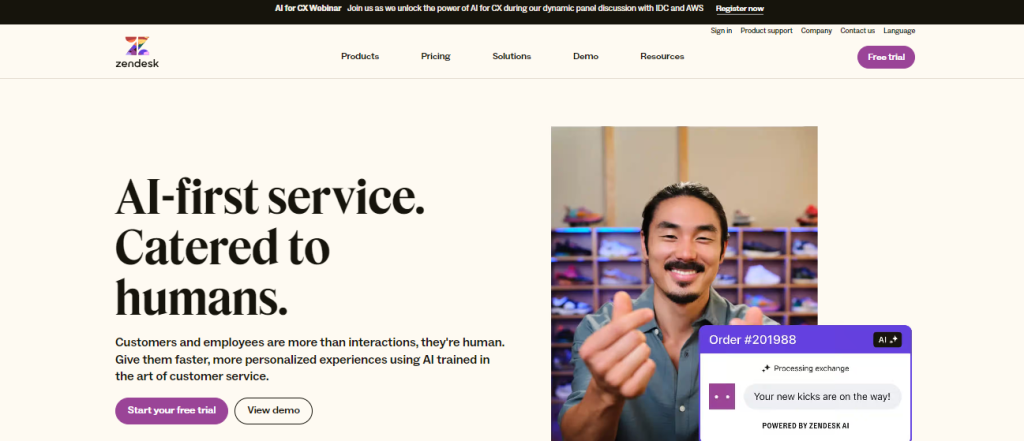
AI-powered chatbots like Zendesk and LivePerson handle customer queries 24/7, ensuring immediate responses and freeing up your team for more complex tasks.
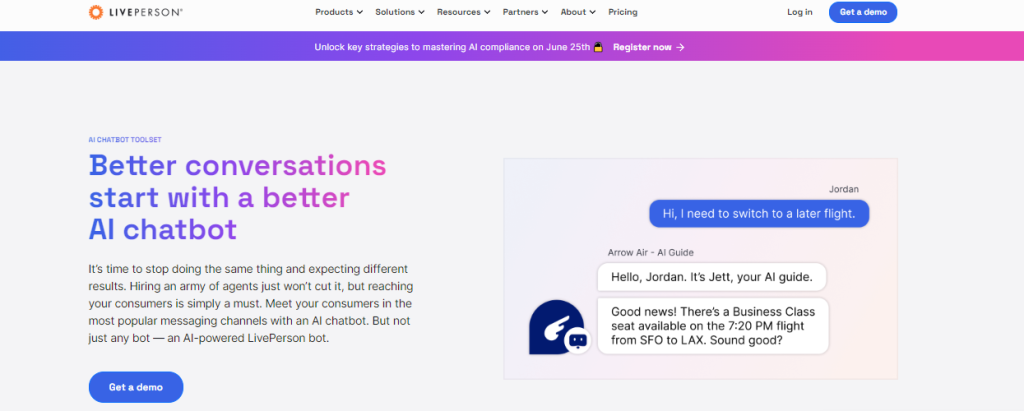
Key Benefits:
- Instant Response: Customers receive immediate assistance, reducing wait times and improving satisfaction.
- Cost-Effective: Automating customer service interactions can reduce the need for large support teams.
- Available 24/7: Provide round-the-clock support without the need for continuous human presence.
Top Tools:
- Zendesk: Offers robust AI-driven customer support, integrating seamlessly with your existing systems.
- LivePerson: Utilises conversational AI to engage customers effectively across multiple channels.
2. CRM Systems
CRM systems like Salesforce, Relay.app and HubSpot leverage AI to analyse prospects, anticipate customer requirements, and automate data transfer and workflows.
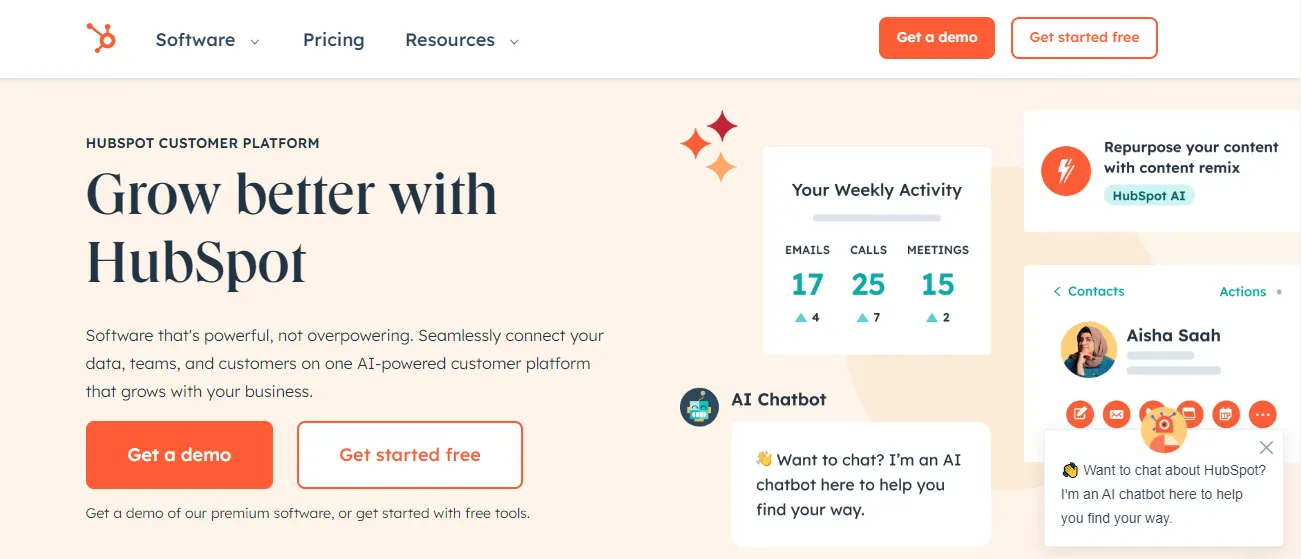
This helps build stronger associations with your customers and boost sales.
| Tool | Features |
|---|---|
| Salesforce | Predictive analytics, automated workflows |
| HubSpot | Marketing automation, customer segmentation |
Why Use It?
- Centralised Customer Data: Consolidate customer information in one place for easy access and management.
- Improved Customer Relations: Personalise interactions based on customer data and insights.
- Enhanced Sales Strategies: Use predictive analytics to tailor sales approaches and increase conversions.
3. Email Marketing Automation
Tools like Mailchimp and SendinBlue use AI to personalise email campaigns, predict the best times to send emails, and analyse campaign performance. Automated email marketing can significantly increase engagement and conversion rates.
Key Features:
- Personalisation at Scale: Tailor email content to individual preferences and behaviours.
- Improved Open Rates: Optimise sending times and subject lines for better engagement.
- Detailed Analytics: Monitor campaign performance and adjust strategies in real-time.
4. Content Creation and Curation
Platforms like Copy.ai and Jarvis can generate high-quality content tailored to your audience.
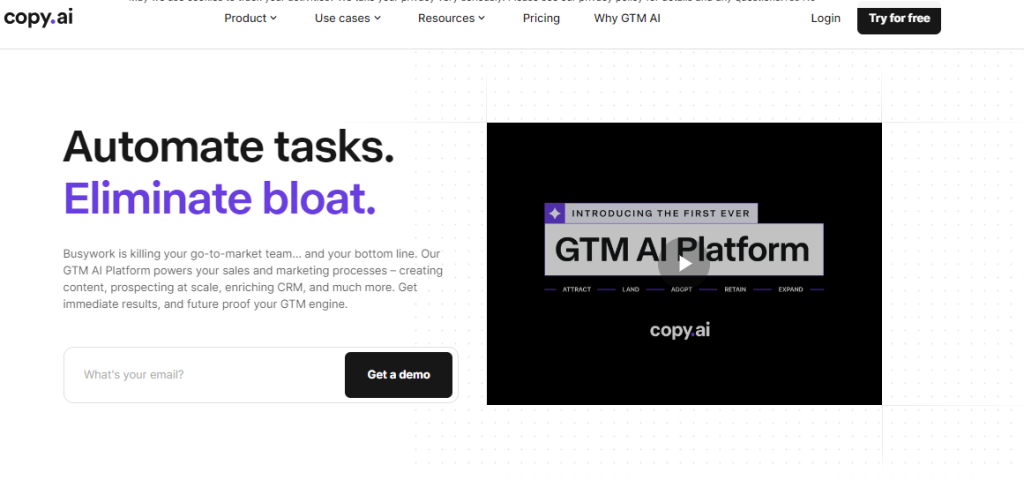
These AI tools help create blog posts, social media updates, and marketing copy, saving time and ensuring consistency in your brand voice.
| Tool | Features |
|---|---|
| Copy.ai | AI-powered content generation |
| Jarvis | Customizable writing templates |
Advantages:
- Consistent Brand Voice: Maintain uniformity across all content pieces.
- Time-Saving: Automate content creation processes.
- High-Quality Content: Generate engaging and relevant content for your audience.
5. Inventory Management
AI-driven inventory management systems like TradeGecko and Orderhive optimise stock levels, forecast demand, and automate reordering processes.
This minimises the chances of overstocking or stockouts, ensuring smooth and efficient operations.
Top Benefits:
- Optimised Stock Levels: Maintain appropriate inventory levels to meet demand without excess.
- Reduced Waste: Minimise the likelihood of expired or obsolete stock.
- Automated Reordering: Streamline the replenishment process to avoid stockouts.
6. Predictive Analytics
Tools like IBM Watson and SAS Analytics use AI to predict market trends, customer behaviour, and business outcomes.
These insights help you make informed decisions and stay ahead of the competition.
| Tool | Application |
|---|---|
| IBM Watson | Market trends, customer insights |
| SAS Analytics | Business forecasting |
Why Implement It?
- Strategic Decision-Making: Use data-driven insights to guide business strategies.
- Improved Forecasting Accuracy: Anticipate future trends and behaviours with greater precision.
- Competitive Edge: Stay ahead by proactively adapting to market changes.
7. Virtual Assistants
Administrative tasks, meeting scheduling, and email management are all handled by AI virtual assistants like Amazon Alexa and Google Assistant. You can concentrate on more strategic aspects of your business as a result of this.
Use Cases:
- Managing Schedules: Automatically organise and update your calendar.
- Email Management: Sort, prioritise, and respond to emails efficiently.
- Administrative Support: Handle routine tasks to free up your time for higher-value activities.
8. Sales Optimisation
AI tools like Gong and Chorus analyse sales calls and provide insights on what strategies are working and where improvements are needed. This helps your sales team refine their approach and close more deals.
| Tool | Key Features |
|---|---|
| Gong | Sales call analysis, feedback loops |
| Chorus | Conversation intelligence, deal insights |
Benefits:
- Enhanced Sales Strategies: Identify and replicate successful tactics.
- Improved Close Rates: Increase the likelihood of closing deals with data-driven insights.
- Data-Driven Feedback: Provide your team with actionable feedback based on real interactions.
9. Customer Feedback Analysis
Popular customer feedback tools like Userback, Survicate, MonkeyLearn and RapidMiner use AI to analyse customer feedback from surveys, reviews, and social media. This helps you understand customer sentiments and improve your products or services accordingly.
Survicate, in particular, is a robust yet easy-to-use tool for collecting and analysing continuous customer feedback across email, web, in-product, and mobile apps.
Advantages:
- Deep Customer Insights: Gain a thorough understanding of customer opinions and feelings.
- Sentiment Analysis: Detect positive, negative, and neutral sentiments in feedback.
- Actionable Feedback: Use insights to make informed improvements to your offerings.
10. Social Media Management
AI tools like Hootsuite, Circleboom, and Sprout Social can design, plan, automate, and schedule your social media posts. They can also go as far as analysing performances and suggesting the best ways to optimise campaigns.
In addition, other tools like Engage AI helps you boost content and comment engagement with generative AI.
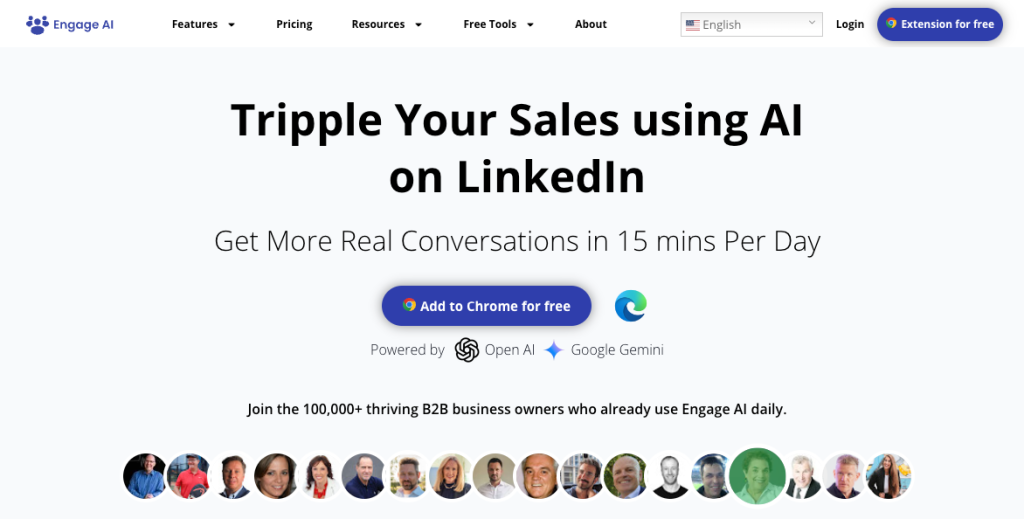
They are instrumental in efficiently managing your social media presence and fostering engagement with your audience.
| Tool | Key Features |
|---|---|
| Hootsuite | Post scheduling, performance analytics |
| Sprout Social | Engagement tracking, content suggestions |
| Engage AI | Content and Comment Engagement with Generative AI |
| Circleboom | Helps users to strengthen their social circle! |

Why Use It?
- Consistent Posting Schedule: Ensure regular and timely content distribution.
- Performance Insights: Monitor and analyse the effectiveness of your social media efforts.
- Audience Engagement: Interact with your followers and grow your online presence.
11. Networking Management
Otter.ai is an interesting tool that transcribes meetings, interviews, and conference recordings.
Grip is renowned for its matchmaking abilities, especially at networking events, which enables attendees to connect appropriately.
Popl.co is another interesting tool worthy of mention. It helps businesses create digital business cards which are effective in sharing an unlimited amount of information with prospects.
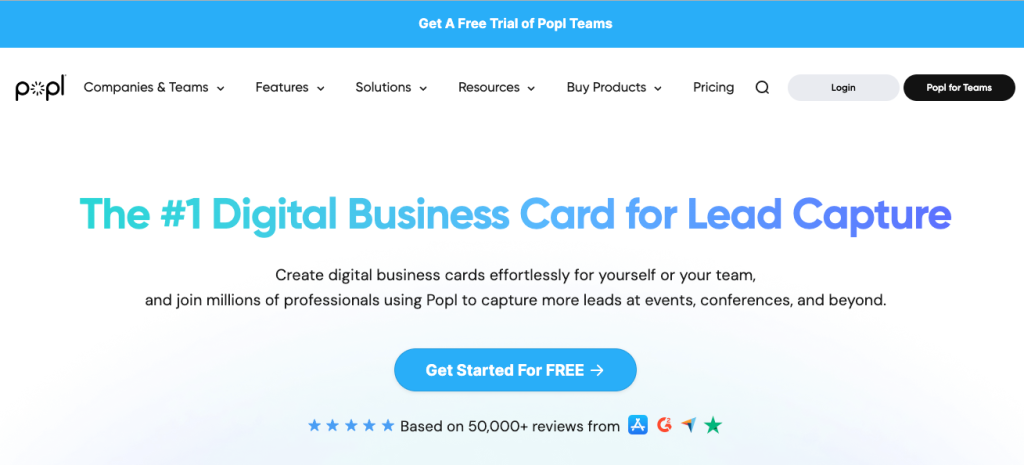
12. Fraud Detection
AI-driven fraud detection solutions such as Sift and Signifyd examine transaction patterns to identify and thwart fraudulent activities. This capability is essential for safeguarding your business and upholding customer trust.
Key Features:
- Real-Time Fraud Detection: Identify and block suspicious activities as they occur.
- Transaction Analysis: Monitor and analyse transaction data for potential fraud.
- Customer Protection: Safeguard your customers’ information and your business reputation.
Integrating these AI tools into your business can drive efficiency, enhance customer experiences, and ultimately lead to growth. Stay ahead of the curve by embracing the power of AI today!
Implementation Strategies
- Assess Your Needs
Begin by identifying the specific areas in your business that could benefit from AI tools. Evaluate current pain points, inefficiencies, and opportunities for improvement.
- Research and Choose the Right Tools
Conduct thorough research to select AI tools that align with your business objectives. Consider features, pricing, and user reviews to make informed decisions.
- Pilot Programmes
Start with pilot programmes to evaluate the efficacy of AI tools in your operations. Gather responses from your team and make necessary adjustments before full implementation.
- Train Your Team
Invest in training your team so they understand how to use AI tools effectively. Provide ongoing support and resources to help them adapt to new technologies.
- Monitor and Optimise
Keep monitoring the performance of AI tools and their impact on your business. Use analytics and feedback to optimise processes and maximise benefits.
Real-World Success Stories
Case Study 1: Chatbots in E-commerce
An online retailer integrated Zendesk chatbots to manage customer inquiries. This initiative led to a notable 30% decrease in response times and a 20% rise in customer satisfaction. Additionally, the workload of their customer service team significantly decreased, enabling them to concentrate on addressing more intricate issues.
Case Study 2: CRM in Real Estate
A real estate agency adopted HubSpot CRM to manage client relationships and automate marketing campaigns. The agency experienced a 25% increase in lead conversions and a 15% boost in sales within the first six months. The AI-powered insights helped them tailor their marketing efforts more effectively.
Case Study 3: Inventory Management in Retail
A mid-sized retail chain used TradeGecko to manage inventory across multiple locations. The AI-driven system optimised stock levels, reducing excess inventory by 18% and stockouts by 25%. The automated reordering process saved significant time and resources.
The post Revolutionise Your Small Business With These Essential AI Tools appeared first on Real Business.